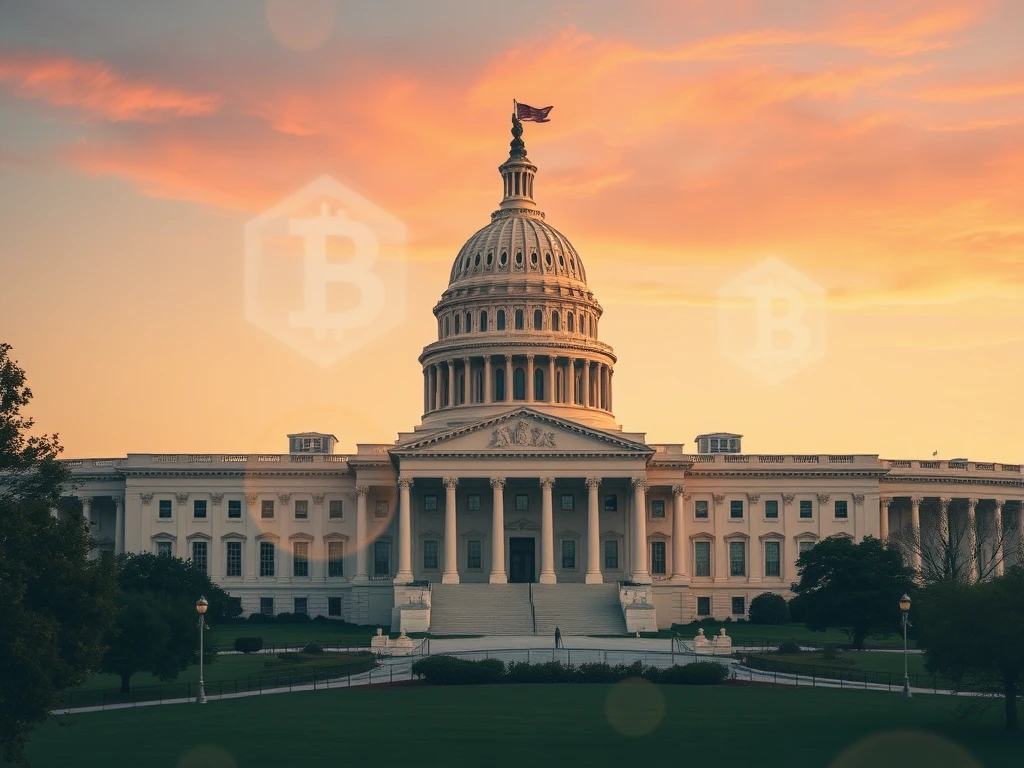Breakthrough: Stablecoin Bill Advances in US Senate

A significant development has occurred for crypto regulation in the United States. The stablecoin bill, known as the GENIUS Act, has successfully passed a key procedural vote and is now advancing within the US Senate. This move comes weeks after similar legislative efforts faced delays.
Stablecoin Bill Clears Key Hurdle
In a crucial 68-30 vote, the US Senate decided to move forward with the Guiding and Establishing National Innovation for US Stablecoins, or GENIUS Act. This bill was introduced over a month ago, and Wednesday’s vote marks a significant step in its journey through Congress. The vote was for cloture, which limits debate and sets the stage for a final floor vote.
US Senate Debates Crypto’s Future
Speaking on the Senate floor, Majority Leader John Thune urged fellow members to support the GENIUS Act. He echoed sentiments about positioning the US as a leader in the digital asset space, aligning with points made by President Donald Trump regarding making the country a “crypto capital of the world.” A bipartisan group of senators supported the cloture vote, indicating potential broader support for some form of crypto regulation.
Thune acknowledged that more work is needed regarding digital assets, referencing the CLARITY Act, a market structure bill under consideration in the House of Representatives. That bill also recently advanced through two House committees.
The GENIUS Act: Support and Opposition
While the bill saw support, it also faced criticism. Massachusetts Senator Elizabeth Warren voiced concerns from the Senate floor, highlighting what she described as “core problems” with the GENIUS Act. She stated that the chamber had failed to address these issues by not voting on certain proposed bipartisan amendments.
Senator Warren reiterated worries, shared by many Democrats, regarding President Trump’s connections to his family-backed crypto platform, World Liberty Financial. She criticized the potential for rewarding holders of his memecoin, suggesting it could allow trading presidential favors for financial gain. Warren argued that passing the GENIUS Act would not only bless this perceived corruption but actively facilitate its expansion, stating, “The GENIUS Act is riddled with loopholes and contains weak safeguards for consumers, national security, and financial stability.”
Stablecoin Regulation Moves Forward
This vote indicates a legislative appetite in the US Senate to establish a framework for stablecoin regulation. Despite differing views on the specifics and potential implications, the advancement of the GENIUS Act signifies that discussions around integrating cryptocurrency into the mainstream financial system are gaining traction in Congress. The debate surrounding consumer protection, national security, and financial stability within stablecoin regulation is expected to continue as the bill moves towards a potential full Senate vote and consideration by the House.
Summary: What’s Next for Stablecoins in the US?
The passage of the cloture vote for the GENIUS stablecoin bill is a notable development in the US legislative process for digital assets. It sets the stage for further debate and a final vote in the Senate. While proponents see it as a necessary step for crypto regulation and making the US a leader, opponents raise concerns about potential loopholes and conflicts of interest. The bill’s future path, including a potential vote in the House on the related CLARITY Act, will be closely watched by the cryptocurrency industry and regulators alike. This ongoing legislative activity underscores the increasing focus on stablecoin regulation at the highest levels of government.







